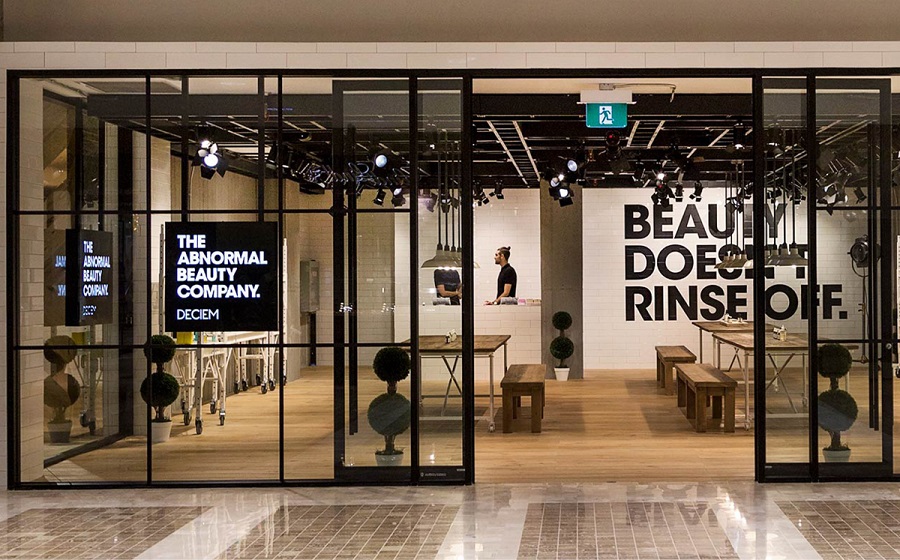When I walked into the cavernous, bare bones, industrial-chic Deciem store in the Distillery section of Toronto last summer and saw this bold declaration plastered on the wall, Beauty Is Between You and You, it was my first introduction to “The Abnormal Beauty Company.”
I spent a good 20 minutes in the shop on that chilly evening, reading labels and soaking in the company gestalt — while the group I was with waited patiently outside. Although I didn’t ultimately buy anything, my suitcase was already stuffed to the gills and Toronto was just the first stop on a four-city trek through “French Canada,” I was definitely intrigued.
At the time, I wasn’t aware that Estée Lauder had recently purchased a small stake in the company. Well, let me amend that; I knew that EL Companies had acquired a chunk of Deciem. I just wasn’t connecting the mental dots between Deciem and The Ordinary, which was the main brand on offer in that sharp-looking, warehouse-like shop.
For the uninitiated (and it would be almost a full-time job to keep up with all the acquisitions in le monde de beauté), Deciem, founded in Toronto in 2013, is made up of many, many brands across the skincare, hair care and bath and body categories. When Lauder purchased a 28 percent stake in June 2017, it comprised “just” 10 brands. (The name Deciem is a riff on “decimam,” the Latin word for tenth) Now, according to a tiny drop-down menu on the main Deciem website, another five brands have been added to the lineup — quintus decimus!
The Overnight Multibrand Corporation
Think about that for a moment: Deciem was founded in 2013 and is already up to 15 brands. That would be like Lauder launching its flagship Estée Lauder brand, Clinique, MAC, Bobbi Brown and Tom Ford Beauty –- plus 10 other brands –- in the space of five years.
Except that Deciem isn’t Lauder. It may be partially owned by Lauder, but in no way, is it being built in the disciplined, polished, brick-by-brick fashion that the 72-year-old beauty behemoth was erected. For starters, only one of Deciem’s brands –- the highly regarded millennial skincare darling The Ordinary –- seems to have major traction.
And one would be hard-pressed to find two more different CEOs at the helm than Deciem founder Brandon Truaxe and Leonard Lauder. Night and day doesn’t even begin to cut it.
Since Lauder acquired a minority stake, Deciem has ratcheted up its number of freestanding stores and garnered massive buzz for The Ordinary. And it’s easy to see why people swoon over The Ordinary. In the Authenticity Era, it’s among the most transparent brands around, plastering its levels of active ingredients right on the label. Completely devoid of flowery mumbo jumbo, its products boast easy-to-wrap-your-mind-around names like “100% Plant-Derived Squalane and Niacinamide 10% + Zinc 1%.”
The Ordinary is also extraordinarily affordable –- another feather in its transparency cap. Now that direct-to-consumer brands like Beauty Pie have blown the whistle on the industry’s ridiculous markups, consumers are onto the fact that they can get truly effective prestige skincare without paying an arm and a leg for it.
So that’s what’s good about disruptive Deciem: they take risks, they buck the norm, they launch a corporate umbrella with 10 brands sheltered underneath and continue to add more at breakneck speed. They keep prices low and product quality high.
The Darker Side of Deciem
But there’s a darker side to Deciem, one that could be putting some major chinks in its shiny upstart armor.
In recent months, Truaxe, a wildly charismatic dude if ever there was one, has really gone off the rails on social media. You’ll have to Google him to get a sense of what I’m getting at. I don’t want to get into too much detail here because I’m a wimp; Truaxe has attacked journalists in print when they’ve been less than fawning — and I happen to like my happy little tennis-filled life down here in Florida.
I will say this, however; I feel sad for Lauder right now. As they tend to be, they were right out in front with their acquisition of a chunk of Deciem. No doubt they thought they were buying a hip slice of the Authenticity pie, and the hordes of millennials that came along with it.
But once the ink was dry on the agreement, I’m sure there were a few raised eyebrows at Lauder at the extremely long and open letter Truaxe published on the Deciem website explaining his decision to (finally, as he states repeatedly) cave to The Man and accept outside funding.
In his “Letter from Brandon On Deciem’s Partnership with The Estée Lauder Companies,” Truaxe discusses in minute detail his struggle in fending off all his many corporate suitors. Private equity? No way, José; they want actual control.
In contrast, he says, “the Estée Lauder Companies approached this investment in the most unexpected of manners and with more love than I could ever express in words.” What that nets out to, dear readers, is a decidedly hands-off policy. “The ELC team never questioned our margins, our pricing strategy, our future plans or our disruptiveness – they embraced all of it.”
And then Truaxe gets to the true heart of the matter and why he chose Lauder over every other firm eager to throw money at him. He writes: “While I do sincerely believe that ELC has embraced everything about us, the facts are nonetheless very clear: they have a minority shareholding position; they do not control our decisions or dictate our direction; and I continue to remain CEO (and there is documentation in place to make it nearly impossible to fire me).”
In other words, even if he pulls a Roseanne Barr, he isn’t going anywhere.
Memo to Brandon Truaxe: That “love” you mentioned Lauder gave you so willingly? Maybe it should be a two-way street.




